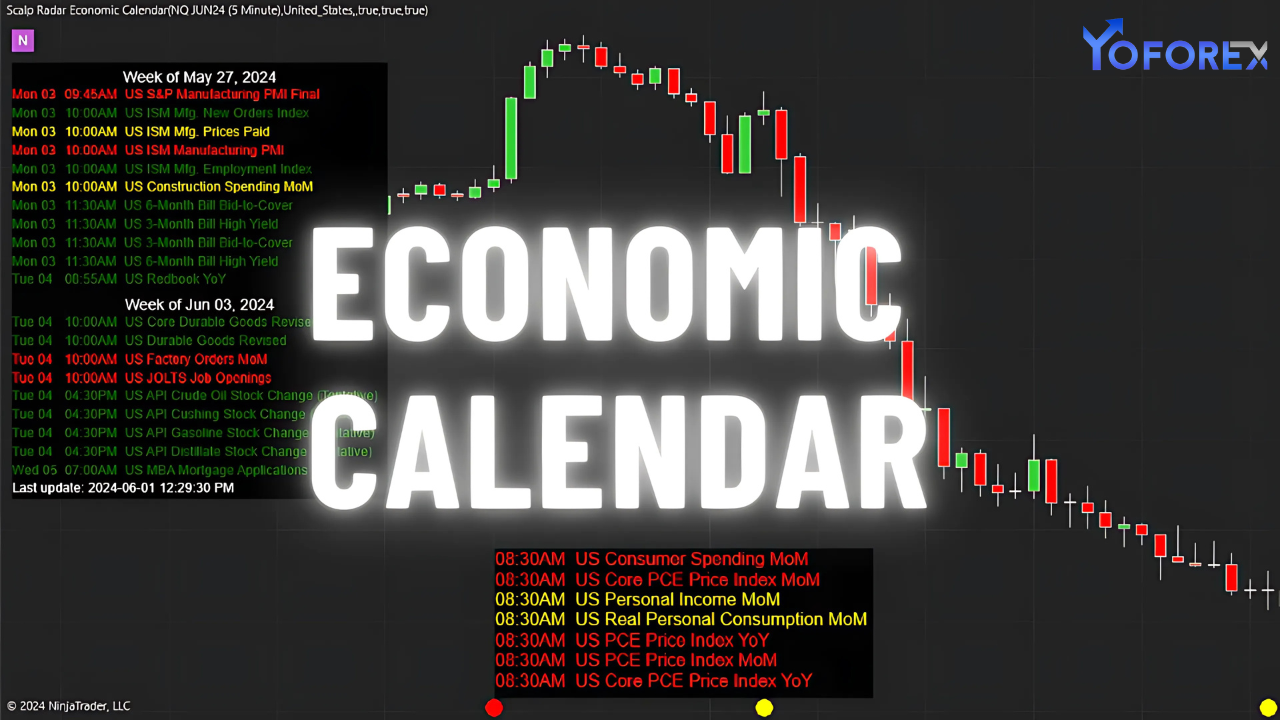Forex trading is an intricate world where precision, timing, and informed decision-making can distinguish between profit and loss. The economic calendar is one of the most powerful tools in a trader’s arsenal. This simple yet effective resource provides traders with a schedule of key financial events, helping them anticipate market movements and align their strategies accordingly. Let’s delve into how economic calendars can be leveraged to time your forex trades effectively.

What Is an Economic Calendar?
An economic calendar is a schedule of major financial events, data releases, and announcements that can influence the global financial markets. These events include reports such as GDP figures, employment data, central bank meetings, interest rate decisions, and more. Each event is accompanied by predictions and actual results, providing traders with vital information to assess market trends.
Why Economic Calendars Matter in Forex Trading
The forex market is highly sensitive to macroeconomic data. Traders rely on economic calendars to:
- Anticipate Volatility: High-impact events, such as Federal Reserve interest rate decisions or Non-Farm Payroll (NFP) reports, can cause significant volatility in currency pairs.
- Plan Trades: By knowing when key events are scheduled, traders can plan their entries and exits to capitalize on or avoid heightened market activity.
- Understand Market Sentiment: Economic calendars provide insights into market expectations, allowing traders to gauge the mood and potential reactions of market participants.
- Enhance Risk Management: Traders can adjust their strategies to manage risks better during periods of increased volatility.
Key Components of an Economic Calendar
Understanding an economic calendar involves recognizing its key elements:
- Date and Time: The specific date and time when an economic event is scheduled.
- Event Name: The title or type of event, such as GDP release, unemployment rate, or central bank meeting.
- Currency Impact: The currency likely to be affected by the event, often denoted by country.
- Impact Level: Typically categorized as low, medium, or high impact, indicating the potential effect on the market.
- Previous, Forecast, and Actual Values:
- Previous: Data from the last event.
- Forecast: Market expectations.
- Actual: The released data during the event.
How to Use Economic Calendars Effectively
To use an economic calendar to time your forex trades, follow these steps:
1. Identify High-Impact Events
Focus on events with a high impact on your chosen currency pairs. For example, if you trade EUR/USD, pay close attention to European Central Bank (ECB) meetings and U.S. Federal Reserve announcements.
2. Analyze Forecast vs. Actual Data
Market movements often hinge on whether actual data meets, exceeds, or falls short of forecasts. For instance, if employment data is stronger than expected, the currency is likely to strengthen.
3. Prepare Before the Event
Set up your strategy before the scheduled event. Decide whether you want to trade before the news release, during the event, or after the market reaction.
4. Manage Risks
Economic events can lead to sudden price spikes and slippage. Use tools like stop-loss orders and reduced position sizes to manage risks effectively.
5. Monitor Multiple Calendars
Different platforms may have varying data and interpretations. Cross-check multiple economic calendars to ensure you’re not missing crucial information.
Examples of Major Economic Events
Here are some common high-impact events that traders watch closely:
- Interest Rate Decisions Central banks like the Federal Reserve, ECB, or Bank of Japan announce interest rate changes, which directly influence currency strength.
- Employment Reports Data like the U.S. Non-Farm Payroll (NFP) report or UK employment figures provide insights into economic health and influence monetary policy.
- Inflation Data Reports on the Consumer Price Index (CPI) and Producer Price Index (PPI) indicate inflation trends and central bank actions.
- GDP Reports Gross Domestic Product (GDP) growth rates reflect overall economic performance and can shift market sentiment.
- Geopolitical Events Unexpected geopolitical developments, such as trade negotiations or political instability, often trigger major market reactions.
Strategies for Trading Economic Events
Economic calendar events can be traded in various ways:
1. News Trading
News traders aim to capitalize on the immediate market reaction following an economic event. This approach requires quick decision-making and efficient execution tools.
2. Breakout Trading
Market volatility during major news releases often creates breakout opportunities. Traders can place pending orders above resistance or below support levels to capture price moves.
3. Post-Event Trading
Some traders prefer to wait for the dust to settle after a major event. This approach involves analyzing the market’s reaction and identifying new trends.
4. Hedging
To mitigate risks during volatile periods, traders can use hedging strategies by taking positions in correlated or counteracting instruments.
Tips for Success
- Stay Updated: Keep your calendar synced with global economic events and time zones.
- Practice Patience: Avoid impulsive decisions; wait for confirmed trends.
- Combine Tools: Use technical analysis alongside economic calendars to confirm trade setups.
- Use Alerts: Many economic calendars offer alert features, ensuring you don’t miss important events.
- Backtest Strategies: Test your economic event trading strategies on historical data to evaluate effectiveness.
Common Mistakes to Avoid
- Overtrading: Avoid trading every event; focus on those with significant impact.
- Ignoring Market Sentiment: Don’t rely solely on numbers; consider the broader market sentiment.
- Neglecting Risk Management: Protect your capital with proper risk management techniques.
- Misinterpreting Data: Understand the context of the data before acting.
- Skipping Preparation: Always have a plan and stick to it.
Conclusion
Economic calendars are indispensable for timing forex trades. By providing a structured view of key financial events, they enable traders to make informed decisions and navigate the complexities of the forex market. Whether you’re a novice or an experienced trader, integrating economic calendar analysis into your trading routine can enhance your strategy and boost your success rate.
Remember, the forex market’s dynamic nature demands continuous learning and adaptation. With the right tools, disciplined strategies, and a keen understanding of economic events, you can seize profitable opportunities and achieve long-term success in forex trading.

